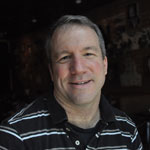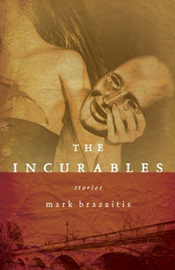Interview by Kelcey Parker
Talking Writing is pleased to join author Kelcey Parker in co-publishing interviews with TW's featured fiction writers. Kelcey's "How to Become a Writer" series appears on her website Ph.D. in Creative Writing, where she's been running interviews with authors since July 2011.
Each writer answers the same five questions. First up for TW: Mark Brazaitis.
Mark Brazaitis is the author of five books, including The Incurables: Stories, winner of the 2012 Richard Sullivan Prize from the University of Notre Dame Press.
 Brazaitis' book of poems, The Other Language, won the 2008 ABZ Press First Book Prize, judged by Heather McHugh. He is also the author of The River of Lost Voices: Stories from Guatemala, winner of the 1998 Iowa Short Fiction Award, and Steal My Heart, a novel published in 2000 by Van Neste Books. His second collection of stories, An American Affair, won the 2004 George Garrett Fiction Prize from Texas Review Press and was published in 2006.
Brazaitis' book of poems, The Other Language, won the 2008 ABZ Press First Book Prize, judged by Heather McHugh. He is also the author of The River of Lost Voices: Stories from Guatemala, winner of the 1998 Iowa Short Fiction Award, and Steal My Heart, a novel published in 2000 by Van Neste Books. His second collection of stories, An American Affair, won the 2004 George Garrett Fiction Prize from Texas Review Press and was published in 2006.A former Peace Corps volunteer and technical trainer, Brazaitis is a professor of English and the director of the Creative Writing Program at West Virginia University. Born in East Cleveland, Ohio, he lives in Morgantown, West Virginia, with his wife and two daughters.
When I was growing up, I didn't have posters of rock bands on my bedroom walls. I had pictures of Leo Tolstoy, Ivan Turgenev, and Fyodor Dostoevsky.
1. Why did you want to become a writer?
MB: Writers, particularly poets, were revered in my family. My maternal grandmother spoke of Robert Frost, Emily Dickinson, and William Butler Yeats as if they were gods. (She met Robert Frost at a Bread Loaf conference. It was one of the high points of her life.) My paternal grandmother said she was particularly proud of one of my first published short stories, "The Liar," because it appeared in the same journal (Western Humanities Review) as a Joyce Carol Oates story. She loved Oates's work.
My father was a reporter and columnist for The (Cleveland) Plain Dealer, and even when I was too young to know what he was up to, his work seemed to me significant. Later, he invited me to follow him around on various assignments, and I loved the whole process—gathering the facts of a story, writing the story, seeing the story in the newspaper the next day.
When I was growing up, I didn't have posters of rock bands on my bedroom walls. I had pictures of Leo Tolstoy, Ivan Turgenev, and Fyodor Dostoevsky. Yes, I was strange. But to do what they had done—create such vibrant and potent worlds between book covers—was something to aspire to.
2. How did you go about becoming a writer?
MB: I thought I would become a journalist, like my father. In college, I wrote for the Harvard Crimson. I wrote about sports, thinking the sports beat offered the most creative freedom. While I couldn't invent facts, I could be inventive in how I reported them. I sometimes wrote as many as six stories a week. It was excellent practice. I had summer internships on the Richmond Times-Dispatch and the Detroit Free Press. I also wrote (or ghostwrote, mostly) for a magazine my mother published for the collision repair industry of Washington, D.C. It was called Hammer and Dolly. I had more creative license here than anywhere. I once wrote a column under the byline of the office cat, Frumpkin.
I also wrote stories, poems, and, in my senior year of college, a terrible novel.
So: practice, practice, practice.
3. Who helped you along the way, and how?
MB: In my teens and twenties, I took a number of writing classes, and my teachers—Lewis Hyde, Charles Martin, Philip O'Connor, Richard Messer, Robert Early, Howard McCord—were excellent. I have an M.F.A. from Bowling Green State University, and that experience was good.
But, the place I learned to write was Guatemala, where I was a Peace Corps Volunteer from 1990 to 1993. To step out of one's culture and one's language is to see oneself and one's country and everything one has ever believed in in fresh and even startling ways.
And, of course, great writers have helped me become a writer because I have absorbed their voices.
4. Can you tell me about a writer or artist whose biography inspires you?
MB: I recently finished George Orwell's Homage to Catalonia. He was willing to risk his life for a cause he believed in (the Republic in the Spanish Civil War). He was also willing to tell the truth when the political infighting in the Republic made it impossible for him to continue fighting for it—and impossible for the Republic to win the war.
Leo Tolstoy was an aristocrat who insisted on making his own shoes.
John Steinbeck's Travels with Charley shows the decent, thoughtful man behind the writer.
Adrienne Rich did so much for human rights, as well as for poetry.
Abraham Lincoln and Martin Luther King Jr. wrote beautifully as they changed the world.
5. What would you say in a short letter to an aspiring writer?
MB: There's a lot to be learned from doing all kinds of writing. Don't pigeonhole yourself as a fiction writer or a poet. Call yourself a writer, and write about everything you can, in as many genres as you can.
This interview originally appeared as "How Mark Brazaitis Became a Writer" in Ph.D. in Creative Writing on October 14, 2012.
 Read More of Mark Brazaitis's Work
Read More of Mark Brazaitis's Work
- The Incurables. University of Notre Dame Press (2012).
- "Cancer Is a Killer, and So Am I," Talking Writing, September 2012.
- "Blackheart," Witness, June 2012.
- "Barbados," H.O.W., April 2012.
- "Truth Poker," Carve, Summer 2011.
